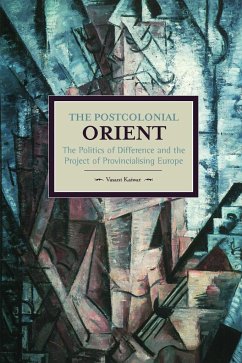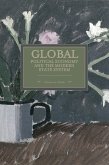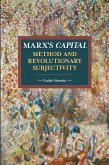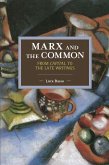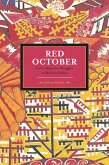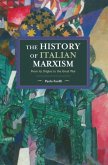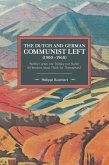Vasant Kaiwar
The Postcolonial Orient
The Politics of Difference and the Project of Provincialising Europe
Vasant Kaiwar
The Postcolonial Orient
The Politics of Difference and the Project of Provincialising Europe
- Broschiertes Buch
- Merkliste
- Auf die Merkliste
- Bewerten Bewerten
- Teilen
- Produkt teilen
- Produkterinnerung
- Produkterinnerung
In this incisive and impeccably researched critique of Postcolonialism, Kaiwar argues that subaltern studies itself is marred by orientalism.
Andere Kunden interessierten sich auch für
![Global Political Economy and the Modern State System Global Political Economy and the Modern State System]() Tobias Ten BrinkGlobal Political Economy and the Modern State System34,99 €
Tobias Ten BrinkGlobal Political Economy and the Modern State System34,99 €![Plebeian Power Plebeian Power]() Álvaro García LineraPlebeian Power34,99 €
Álvaro García LineraPlebeian Power34,99 €![Marx's Capital, Method and Revolutionary Subjectivity Marx's Capital, Method and Revolutionary Subjectivity]() Guido StarostaMarx's Capital, Method and Revolutionary Subjectivity34,99 €
Guido StarostaMarx's Capital, Method and Revolutionary Subjectivity34,99 €![Marx and the Common Marx and the Common]() Luca BassoMarx and the Common35,99 €
Luca BassoMarx and the Common35,99 €![Red October Red October]() Jeffery R WebberRed October40,99 €
Jeffery R WebberRed October40,99 €![The History of Italian Marxism The History of Italian Marxism]() Paolo FavilliThe History of Italian Marxism45,99 €
Paolo FavilliThe History of Italian Marxism45,99 €![The Dutch and German Communist Left (1900-1968) The Dutch and German Communist Left (1900-1968)]() Philippe BourrinetThe Dutch and German Communist Left (1900-1968)68,99 €
Philippe BourrinetThe Dutch and German Communist Left (1900-1968)68,99 €-
-
-
In this incisive and impeccably researched critique of Postcolonialism, Kaiwar argues that subaltern studies itself is marred by orientalism.
Hinweis: Dieser Artikel kann nur an eine deutsche Lieferadresse ausgeliefert werden.
Hinweis: Dieser Artikel kann nur an eine deutsche Lieferadresse ausgeliefert werden.
Produktdetails
- Produktdetails
- Verlag: Haymarket Books
- Seitenzahl: 415
- Erscheinungstermin: 22. Dezember 2015
- Englisch
- Abmessung: 229mm x 154mm x 30mm
- Gewicht: 595g
- ISBN-13: 9781608464791
- ISBN-10: 1608464792
- Artikelnr.: 41626712
- Verlag: Haymarket Books
- Seitenzahl: 415
- Erscheinungstermin: 22. Dezember 2015
- Englisch
- Abmessung: 229mm x 154mm x 30mm
- Gewicht: 595g
- ISBN-13: 9781608464791
- ISBN-10: 1608464792
- Artikelnr.: 41626712
Vasant Kaiwar (Ph.D. UCLA, 1989), Visiting Associate Professor of History, Duke University; founder-editor, South Asia Bulletin and Comparative Studies of South Asia, Africa, and the Middle East; and co-editor, Antinomies of Modernity and From Orientalism to Postcolonialism.
Acknowledgements
Preface
1 Introduction
1.1 A narrative of arrival
1.2 1989 and all that
1.3 Postcolonial difference
2 Situating Postcolonial Studies
2.1 Definitions: Colonialism, for example
2.2 Postcolonial modernisation
2.3 Postcolonial populism
2.4 Subaltern Studies
3 Colonialism, Modernity, Postcolonialism
3.1 Colonialism and modernity in a postcolonial framing
3.2 History's ironic reversals
3.3 Who is the 'subaltern' in postcolonial studies?
4 Provincialising Europe or Exoticising India? Towards a Historical and
Categorial Critique of Postcolonial Studies
4.1 Marx and difference in Provincialising Europe
4.2 The not-yet of historicism
4.3 Why historicise?
4.4 Tattooed by the exotic
4.5 Under the sign of Heidegger, I: The woman's question
4.6 Under the sign of Heidegger, II: Imagined communities
4.7 Lack/inadequacy or plenitude/creativity?
4.8 Dominance without hegemony: Historicism by another name?
4.9 The constituent elements of colonial modernity
4.10 Modernity as class struggle
4.11 Orientalism and nativism
4.12 Bahubol and the Muslim question
5 Uses and Abuses of Marx
5.1 Abstract labour, difference, History I and II
5.2 The piano maker and the piano player: Productive and unproductive
labour
5.3 Millennial toil as the 'nightmare of history'
5.4 'Bourgeois hegemony' and colonial rule
5.5 Modernity in the 'fullest sense'
5.6 Beyond the bourgeois revolution? Hegemony revisited
5.7 The historic moment of colonial dominance in India
5.8 A 'liberation from blinding bondage', or the question of historicism
5.9 Marxism and historicism
6 The Postcolonial Orient
6.1 The play of difference, the merchandising of the exotic, tradition and
neo-traditionalism
6.2 The non-commissioned officers
6.3 The Orient as 'vanishing mediator'
6.4 The unrenounceable project
6.5 Provincialising Europe
References
Ind
Preface
1 Introduction
1.1 A narrative of arrival
1.2 1989 and all that
1.3 Postcolonial difference
2 Situating Postcolonial Studies
2.1 Definitions: Colonialism, for example
2.2 Postcolonial modernisation
2.3 Postcolonial populism
2.4 Subaltern Studies
3 Colonialism, Modernity, Postcolonialism
3.1 Colonialism and modernity in a postcolonial framing
3.2 History's ironic reversals
3.3 Who is the 'subaltern' in postcolonial studies?
4 Provincialising Europe or Exoticising India? Towards a Historical and
Categorial Critique of Postcolonial Studies
4.1 Marx and difference in Provincialising Europe
4.2 The not-yet of historicism
4.3 Why historicise?
4.4 Tattooed by the exotic
4.5 Under the sign of Heidegger, I: The woman's question
4.6 Under the sign of Heidegger, II: Imagined communities
4.7 Lack/inadequacy or plenitude/creativity?
4.8 Dominance without hegemony: Historicism by another name?
4.9 The constituent elements of colonial modernity
4.10 Modernity as class struggle
4.11 Orientalism and nativism
4.12 Bahubol and the Muslim question
5 Uses and Abuses of Marx
5.1 Abstract labour, difference, History I and II
5.2 The piano maker and the piano player: Productive and unproductive
labour
5.3 Millennial toil as the 'nightmare of history'
5.4 'Bourgeois hegemony' and colonial rule
5.5 Modernity in the 'fullest sense'
5.6 Beyond the bourgeois revolution? Hegemony revisited
5.7 The historic moment of colonial dominance in India
5.8 A 'liberation from blinding bondage', or the question of historicism
5.9 Marxism and historicism
6 The Postcolonial Orient
6.1 The play of difference, the merchandising of the exotic, tradition and
neo-traditionalism
6.2 The non-commissioned officers
6.3 The Orient as 'vanishing mediator'
6.4 The unrenounceable project
6.5 Provincialising Europe
References
Ind
Acknowledgements
Preface
1 Introduction
1.1 A narrative of arrival
1.2 1989 and all that
1.3 Postcolonial difference
2 Situating Postcolonial Studies
2.1 Definitions: Colonialism, for example
2.2 Postcolonial modernisation
2.3 Postcolonial populism
2.4 Subaltern Studies
3 Colonialism, Modernity, Postcolonialism
3.1 Colonialism and modernity in a postcolonial framing
3.2 History's ironic reversals
3.3 Who is the 'subaltern' in postcolonial studies?
4 Provincialising Europe or Exoticising India? Towards a Historical and
Categorial Critique of Postcolonial Studies
4.1 Marx and difference in Provincialising Europe
4.2 The not-yet of historicism
4.3 Why historicise?
4.4 Tattooed by the exotic
4.5 Under the sign of Heidegger, I: The woman's question
4.6 Under the sign of Heidegger, II: Imagined communities
4.7 Lack/inadequacy or plenitude/creativity?
4.8 Dominance without hegemony: Historicism by another name?
4.9 The constituent elements of colonial modernity
4.10 Modernity as class struggle
4.11 Orientalism and nativism
4.12 Bahubol and the Muslim question
5 Uses and Abuses of Marx
5.1 Abstract labour, difference, History I and II
5.2 The piano maker and the piano player: Productive and unproductive
labour
5.3 Millennial toil as the 'nightmare of history'
5.4 'Bourgeois hegemony' and colonial rule
5.5 Modernity in the 'fullest sense'
5.6 Beyond the bourgeois revolution? Hegemony revisited
5.7 The historic moment of colonial dominance in India
5.8 A 'liberation from blinding bondage', or the question of historicism
5.9 Marxism and historicism
6 The Postcolonial Orient
6.1 The play of difference, the merchandising of the exotic, tradition and
neo-traditionalism
6.2 The non-commissioned officers
6.3 The Orient as 'vanishing mediator'
6.4 The unrenounceable project
6.5 Provincialising Europe
References
Ind
Preface
1 Introduction
1.1 A narrative of arrival
1.2 1989 and all that
1.3 Postcolonial difference
2 Situating Postcolonial Studies
2.1 Definitions: Colonialism, for example
2.2 Postcolonial modernisation
2.3 Postcolonial populism
2.4 Subaltern Studies
3 Colonialism, Modernity, Postcolonialism
3.1 Colonialism and modernity in a postcolonial framing
3.2 History's ironic reversals
3.3 Who is the 'subaltern' in postcolonial studies?
4 Provincialising Europe or Exoticising India? Towards a Historical and
Categorial Critique of Postcolonial Studies
4.1 Marx and difference in Provincialising Europe
4.2 The not-yet of historicism
4.3 Why historicise?
4.4 Tattooed by the exotic
4.5 Under the sign of Heidegger, I: The woman's question
4.6 Under the sign of Heidegger, II: Imagined communities
4.7 Lack/inadequacy or plenitude/creativity?
4.8 Dominance without hegemony: Historicism by another name?
4.9 The constituent elements of colonial modernity
4.10 Modernity as class struggle
4.11 Orientalism and nativism
4.12 Bahubol and the Muslim question
5 Uses and Abuses of Marx
5.1 Abstract labour, difference, History I and II
5.2 The piano maker and the piano player: Productive and unproductive
labour
5.3 Millennial toil as the 'nightmare of history'
5.4 'Bourgeois hegemony' and colonial rule
5.5 Modernity in the 'fullest sense'
5.6 Beyond the bourgeois revolution? Hegemony revisited
5.7 The historic moment of colonial dominance in India
5.8 A 'liberation from blinding bondage', or the question of historicism
5.9 Marxism and historicism
6 The Postcolonial Orient
6.1 The play of difference, the merchandising of the exotic, tradition and
neo-traditionalism
6.2 The non-commissioned officers
6.3 The Orient as 'vanishing mediator'
6.4 The unrenounceable project
6.5 Provincialising Europe
References
Ind
